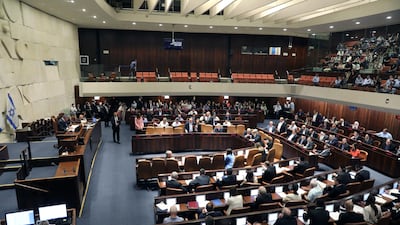Israel was heading on Wednesday for its fifth election in less than four years, plunging it deeper into political uncertainty as it grapples with rising living costs and renewed international efforts to revive a nuclear deal with Iran.
Prime Minister Naftali Bennett moved last week to dissolve parliament after infighting made his ruling coalition no longer tenable. The Knesset set a deadline for midnight on Wednesday for a final vote to dissolve.
Once the call for a snap election gets the Knesset's final approval, Israel's centre-left foreign minister, Yair Lapid, will take over from Mr Bennett as prime minister of a caretaker government with limited powers.
But even with legislators grappling over the exact election date, either October 25 or November 1, the campaign is already being dominated by the possible comeback of former prime minister Benjamin Netanyahu.
Mr Lapid and Mr Bennett ended Mr Netanyahu's record tenure a year ago by forming a rare alliance of rightists, liberals and Arab parties, which lasted longer than many expected but has faltered recently.

Mr Netanyahu, now opposition leader, appears delighted by the end of what he has called the worst government in Israel's history. He hopes to win a sixth term in office despite being on trial over alleged corruption.
Legislators from the pro-Netanyahu bloc said they were working to form a new government before parliament dissolves. That scenario, which appears remote, would scupper an early election.
The anti-Netanyahu camp will probably be led by Mr Lapid, the centrist who has surprised many since being dismissed as a lightweight when he entered politics a decade ago.
As he and Mr Bennett announced last week that their coalition was no longer tenable, Mr Lapid sought to cast Mr Netanyahu's potential return to office as a national threat.
“What we need to do today is go back to the concept of Israeli unity. Not to let dark forces tear us apart from within,” Mr Lapid said.
While parliament's collapse appeared a near certainty, last-minute surprises remained possible given Israel's volatile political climate.
Factions across the political spectrum fear fresh polls will lead to them losing seats or ending up out of parliament entirely by falling below the minimum support threshold, which is 3.25 per cent of votes cast.
But options to avoid another election were vanishing, according to Israeli reports.
That means Mr Lapid was expected to take office at midnight after parliament gave final approval to a dissolution bill, in accordance with the power-sharing deal he agreed with Mr Bennett last June.
A parliamentary committee was due to meet on Wednesday to finalise the bill that must clear two more plenum votes before becoming law.
One reported hold-up was a dispute over the election date.
Mr Netanyahu and his allies are fighting for an October election when their supporters will be on a break from religious study centres, hoping that might boost turnout in what could be another extremely close contest, media reports said.
Mr Bennett, a religious nationalist, has led a coalition of right-wingers, centrists, doves and Islamists from the Raam faction, which made history by becoming the first Arab party to support an Israeli government in the state's 74-year history.
The alliance, united by its desire to oust Mr Netanyahu and break a damaging cycle of inconclusive elections, was imperilled from the outset by its ideological divides.
But Mr Bennett said the final straw was a failure to renew a measure that ensures the roughly 475,000 Jewish settlers in the occupied West Bank live under Israeli law.
Some Arab politicians in the coalition refused to back a bill they said marked a de facto endorsement of a 55-year occupation that has forced West Bank Palestinians to live under Israeli rule.
For Mr Bennett, a staunch supporter of settlements, allowing the so-called West Bank law to expire was intolerable. Dissolving parliament before its expiration on Thursday temporarily renews the measure.
“We fought like lions, down to the very last moment, until it simply became impossible,” Mr Bennett said days after announcing his coalition's demise.
Mr Bennett is expected to stay on as alternate prime minister and be responsible for Iran policy, as world powers take steps to revive stalled talks on Tehran's nuclear programme.
Israel opposes a restoration of the 2015 agreement that gave Iran sanctions relief in exchange for limits on its nuclear programme.
Mr Lapid will retain his foreign minister title while serving as Israel's 14th prime minister. He will find himself under early scrutiny, with US President Joe Biden due in Jerusalem in two weeks.

